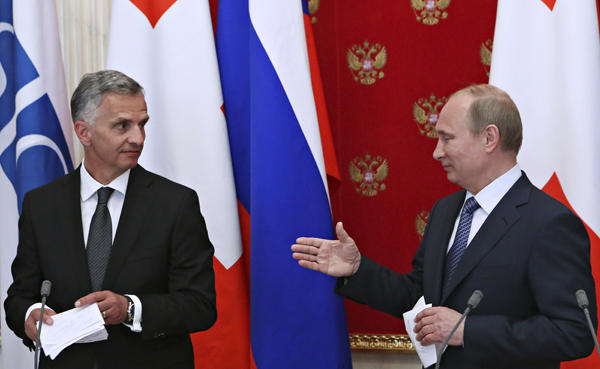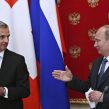
Putin and OSCE’s Chairman Coordinate Road Map for Ukraine
Publication: Eurasia Daily Monitor Volume: 11 Issue: 86
By:

As anticipated (see EDM, May 1), pro-Russia groups have failed to organize the secession referendums, planned for May 11 in Ukraine’s Donetsk and Luhansk oblasts (Donbas). Those marginal groups lack a social, electoral, or organizational base for holding anything resembling referendums. Their paramilitary units have failed to establish any compact territorial base on which to hold a referendum. By May 5 in Luhansk, and May 6 in Donetsk, preparations for referendums had collapsed for all to see (Interfax-Ukraine, novorus.ru, May 5–7).
Acknowledging this failure at the eleventh hour, the Kremlin is now trying to turn necessity into virtue. On May 7, Russian President Vladimir Putin offered to have those referendums “postponed,” in return for political concessions to be extracted from Ukraine, as Moscow hopes, via the OSCE (ITAR-TASS, May 7).
Putin received Didier Burkhalter, Swiss President and concurrently the Organization for Security and Cooperation in Europe’s (OSCE) chairman-in-office, in Moscow on May 7. At their concluding news conference, the outline of a possible arrangement emerged. Putin called on “representatives of eastern and southern Ukraine and supporters of [Ukraine’s] federalization to postpone the referendums scheduled for May 11.”
In return, Putin demanded acceptance of Moscow’s known demands (Interfax, kremlin.ru, May 7, 8):
1.) Ukrainian forces to “immediately cease all punitive operations in the east [against pro-Russia armed groups]”; 2.) Kyiv to release the “political prisoners [several leaders of violent assaults on government buildings in Donbas]’; 3.) a “direct, comprehensive, legally-based dialogue on an equal basis [priamyi, polnotsennyi, polnopravnyi, ravnyi] dialogue between the Kyiv authorities and representatives of eastern and southern Ukraine [thus equalizing them in status]”; and 4.) “reliable guarantees of the legitimate rights of the people of eastern and southern Ukraine [understood as a committing Kyiv to “federalization”]” ahead of Ukraine’s presidential election, which is scheduled to be held on May 25.
With Ukraine’s presidential election apparently unstoppable, the Kremlin can no longer reject a priori that election’s legitimacy. Moscow failed to mobilize resistance to holding the election in Ukraine, except possibly in Donetsk and Luhansk, where Russia’s armed proxies operate. Meeting with Burkhalter in Moscow, Putin had to acknowledge Ukraine’s intention to hold its presidential election as a “step in the right direction.” However, Moscow wants Kyiv to provide those “guarantees” (see above) in advance of the presidential election, so as to pave the way for Ukraine’s “federalization” through the constitution that will be adopted after the election.
Using its armed groups, Moscow can disrupt Ukraine’s presidential election in Donetsk and Luhansk, or force the election’s postponement under the threat of not recognizing the outcome of an election that Moscow itself would have derailed there. Equating the Ukrainian state with the secessionist armed groups, Putin called for an “unconditional end to the use of force” by both “sides.” Thus, implicitly, Moscow attaches political and military pre-conditions to the holding of Ukraine’s presidential election and its date.
Putin made no promise to refrain from disrupting Ukraine’s election in his meeting with Burkhalter. Disclaiming responsibility for the actions of Russian armed groups on Ukrainian territory, Putin insisted that Russia “holds no key” to de-escalation there. Moscow had similarly insisted that it held no influence with its armed proxies when these were holding the OSCE observers hostage. But, when Putin and Lavrov failed in their attempts to use the hostages for political bargaining, the Kremlin smoothly instructed its field commander in Slovyansk to release them (see EDM, May 6).
The Kremlin persists with its refusal to recognize Ukraine’s government as legitimate. It uses all possible circumlocutions, instead of explicitly referring to the “Ukrainian government.” The quadripartite Geneva agreement of April 17, ill-fated all around, similarly avoided using the term “Ukrainian government,” deferring to Moscow’s position (see EDM, April 30, May 1).
In that respect, the situation has not significantly changed since the negotiations that led to the Geneva agreement and its aftermath. Essentially, Russia wants to have its say in Ukraine’s new constitutional arrangements, in return for allowing the election to proceed and accepting the legitimacy of the post-election government.
For his part, Burkhalter urged a halt to “all armed actions,” instead of urging an end to Russia’s cross-border support for armed actions in Ukraine. He remained silent about Russia’s annexation of Crimea, and omitted Ukraine’s territorial integrity and sovereignty, although these are basic principles of the organization he currently chairs. Whether, during his Moscow visit, Burkhalter made any reference to the Ukrainian government as such seems far from clear. Russian media’s coverage of his remarks did not include any reference to a “Ukrainian government.”
The OSCE’s chairmanship proposes a short-term road map in four stages: a halt to all armed actions in eastern Ukraine, de-escalation of tensions, a dialogue “between the sides [sic],” and holding Ukraine’s presidential election on a country-wide basis (apparently without insisting on the May 25 date).
The dialogue would center on round tables with the participation of “official persons, persons carrying political responsibilities, and representatives of the political forces in Kyiv and the regions” (still no Ukrainian “government”), according to Russian media reproducing Burkhater’s remarks. The OSCE would prepare a general plan for disarming illegal armed groups, and would finance the disarmament.
Putin has apparently exercised the right of first consent to the road map. The OSCE’s chairmanship is now presenting the road map to the United States, the European Union and Ukraine—the joint signatories to the Geneva Statement. The OSCE was not a signatory. Burkhalter discussed Ukraine with Putin in Ukraine’s absence.




